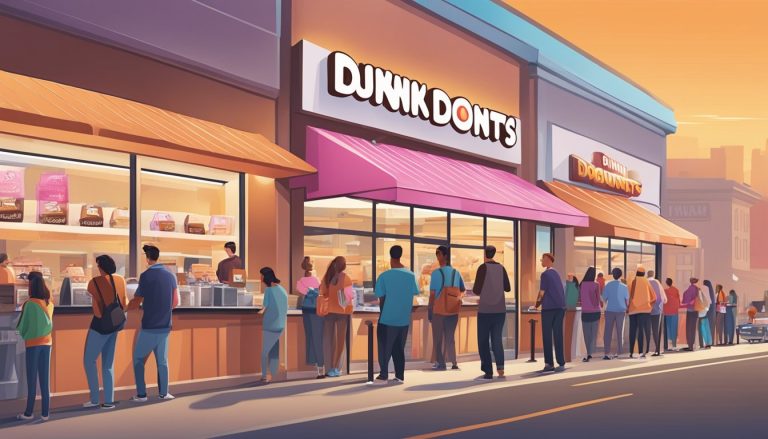Dunkin’ takes food safety and quality control seriously across its global network of quick service restaurants. The company implements rigorous standards to ensure customers receive high-quality food and beverages with every visit.
Dunkin’ Brands’ Quality Assurance team requires all suppliers to comply with global food safety standards through audits and certification programs. This includes adherence to internationally recognized benchmarks like the Global Food Safety Initiative. At the restaurant level, Dunkin’ franchisees must follow strict quality and food safety protocols in their daily operations.
For its signature coffee offerings, Dunkin’ employs a multi-step quality assurance process. This involves sampling incoming coffee beans, conducting independent laboratory testing, and evaluations by the company’s own Coffee Excellence Team. Through these comprehensive measures, Dunkin’ aims to consistently deliver products that meet customer expectations for taste, freshness and safety.
Dunkin’s Legacy and Commitment to Quality

Dunkin’ has built a strong reputation for quality and consistency over its decades-long history. The company’s evolution and dedication to maintaining high standards have been key factors in its enduring success.
The Evolution of Dunkin’ Brands
Dunkin’ began as a simple donut shop in 1950 and has since grown into a global powerhouse. The company expanded its menu beyond donuts to include coffee, breakfast sandwiches, and other food items. This diversification led to the 2018 rebranding from “Dunkin’ Donuts” to simply “Dunkin'”.
The name change reflected the brand’s broader focus on beverages and food options. Dunkin’ now offers a wide array of choices, including sandwiches, wraps, muffins, and croissants. This evolution has helped Dunkin’ stay relevant and competitive in the fast-paced food service industry.
Upholding Dunkin’s Professional Image
Dunkin’ maintains strict quality control measures to ensure consistency across its products. The company employs a multi-step testing process for its coffee beans. This includes sampling incoming beans, monitoring production, and validating finished products against Dunkin’s specifications.
Food safety is a top priority for Dunkin’ Brands. The company requires its franchisees to follow stringent protocols for handling food throughout the supply chain. These measures cover everything from delivery and storage to preparation and service.
Dunkin’ also adheres to Global Food Safety Initiative standards. This commitment to quality and safety helps maintain customer trust and loyalty, reinforcing Dunkin’s professional image in the competitive breakfast market.
Food Safety Standards in Breakfast Offerings
Dunkin’ maintains rigorous food safety protocols for its breakfast menu items. The company employs comprehensive quality control measures and sustainable supply chain practices to ensure customer safety and product excellence.
Implementing Effective Quality Control Measures
Dunkin’ enforces strict quality and food safety standards throughout its production process. The company conducts regular audits and uses detailed checklists to verify adherence to health and safety guidelines at each location. Employees undergo thorough food safety training, covering topics like proper handwashing, allergen management, and identifying imminent health risks.
Multiple quality assurance checkpoints are in place. Incoming ingredients are sampled and tested before production. During processing, products are continuously monitored to meet Dunkin’s specifications. Final products undergo validation by both internal teams and independent laboratories.
If any item fails to meet standards, Dunkin’s Quality Assurance team initiates immediate product recalls or withdrawals from the system. This vigilant approach helps maintain high food safety levels across all breakfast offerings.
Sustainable Supply Chain Management
Dunkin’ prioritizes sustainability in its supply chain to ensure food quality and safety. The company carefully selects suppliers who meet its stringent standards for ingredients and production methods. Regular supplier audits and performance evaluations help maintain consistency and quality.
For coffee, a key breakfast item, Dunkin’ implements a “tree to cup” quality control process. This includes sampling and approving beans before production, monitoring throughout processing, and final product validation.
Dunkin’ also focuses on ingredient transparency. The company provides detailed information about the ingredients used in its breakfast items, allowing customers to make informed choices. This commitment to openness extends to allergen management, with clear labeling and staff training on allergen handling.
By integrating sustainability into its supply chain, Dunkin’ aims to deliver consistently safe and high-quality breakfast options while supporting responsible sourcing practices.
Product Line and Menu Innovation

Dunkin’ has significantly expanded its breakfast offerings and collaborated with plant-based meat alternatives to meet evolving consumer preferences. These initiatives aim to broaden appeal and capture new market segments.
Expanding Breakfast Options
Dunkin’ has diversified its menu beyond traditional donuts and coffee. The chain now offers a wide range of breakfast sandwiches, wraps, and bowls. Popular items include the Bacon, Egg and Cheese on a Bagel and the Wake-Up Wrap.
Healthier options like oatmeal and fruit cups have been added to cater to health-conscious customers. Dunkin’ has also introduced seasonal and limited-time offerings to keep the menu fresh and exciting.
Beverage innovations include cold brew coffee, flavored iced teas, and frozen drinks. These additions help Dunkin’ compete with coffee shop rivals and appeal to younger consumers.
Collaboration with Beyond Meat
In 2019, Dunkin’ partnered with Beyond Meat to launch the Beyond Sausage Breakfast Sandwich. This collaboration marked a significant step into the plant-based protein market.
The sandwich features a Beyond Meat sausage patty made from plant-based ingredients. It’s served on an English muffin with egg and cheese.
This menu addition aims to attract vegetarian and flexitarian customers. It also aligns with growing consumer interest in plant-based alternatives.
The Beyond Sausage Breakfast Sandwich quickly became one of Dunkin’s top-selling sandwiches. Its success led to a nationwide rollout faster than initially planned.
Enhancing Customer Experience Through Service

Dunkin’ prioritizes customer satisfaction through exceptional service and strong franchisee partnerships. These efforts create a welcoming environment and consistent experience across locations.
Emphasizing Customer Service Excellence
Dunkin’ trains staff to deliver friendly, efficient service. Employees greet customers promptly and take orders accurately. The company emphasizes speed without sacrificing quality.
Staff learn to handle complaints professionally and resolve issues quickly. Dunkin’ encourages team members to go above and beyond, such as remembering regular customers’ orders.
The mobile app streamlines ordering and payment. Customers can customize drinks, skip lines, and earn rewards. This technology enhances convenience and satisfaction.
Cleanliness is paramount. Stores maintain rigorous sanitation standards to ensure a pleasant dining environment. Regular inspections help uphold these high standards.
Building Strong Franchisee Relationships
Dunkin’ provides comprehensive support to franchisees. This includes initial training, ongoing education, and operational guidance. Franchisees learn best practices for customer service, food safety, and store management.
The company offers marketing assistance and promotional materials. This helps maintain brand consistency across locations. Franchisees benefit from Dunkin’s national advertising campaigns and local marketing support.
Regular communication channels keep franchisees informed of company initiatives. Dunkin’ solicits feedback from franchisees to improve operations and customer experience. This collaborative approach strengthens the brand and enhances service quality.
Franchisees are encouraged to engage with their local communities. This builds customer loyalty and positive brand perception at the local level.
Strategic Marketing and Brand Partnerships

Dunkin’ leverages innovative marketing tactics and strategic partnerships to strengthen its brand presence and drive customer engagement. The company focuses on social media platforms to connect with consumers while forming alliances that create mutual value.
Leveraging Social Media Marketing
Dunkin’ maintains an active presence across major social media channels, including Instagram, Facebook, and Twitter. The brand uses these platforms to showcase new menu items, run promotional campaigns, and interact directly with customers. Eye-catching visuals of donuts and coffee dominate their feeds, enticing followers to visit stores.
Targeted ads and influencer collaborations help Dunkin’ reach specific demographic groups. The company also encourages user-generated content through hashtag campaigns, boosting organic reach and fostering a sense of community among fans. This social media strategy has proven effective in increasing brand awareness and driving foot traffic to Dunkin’ locations.
Forming Value-Adding Partnerships
Dunkin’ strategically partners with complementary brands to expand its reach and offer unique experiences to customers. Notable collaborations include:
- Co-branded products with CPG companies
- Cross-promotions with entertainment franchises
- Alliances with sports teams and events
These partnerships create buzz, attract new customers, and reinforce Dunkin’s position in the quick-service restaurant market. By aligning with trusted brands, Dunkin’ enhances its credibility and taps into new consumer segments. Such alliances often result in limited-time offerings that drive urgency and boost sales.
Corporate Social Responsibility Initiatives

Dunkin’ has implemented several important corporate social responsibility programs focused on sustainable sourcing and community impact. These initiatives demonstrate the company’s commitment to ethical business practices and giving back.
Advancing Coffee Sustainability Efforts
Dunkin’ has pledged to source 100% of its coffee responsibly by 2025 through its Drive-To Sustainability Program. The company partners with organizations like World Coffee Research and the Sustainable Coffee Challenge to improve farming practices and support coffee-growing communities.
Dunkin’ is mapping its international supply chain to better understand sourcing impacts. The company also aims to increase its use of certified sustainable coffee over time. These efforts help ensure the long-term viability of coffee production while benefiting farmers.
Contributing to the Joy in Childhood Foundation
The Joy in Childhood Foundation is Dunkin’s charitable organization focused on improving children’s health and hunger relief. The foundation provides grants to children’s hospitals, food banks, and other nonprofits serving kids in need.
Key initiatives include the Dogs for Joy program, which brings in-residence dogs to pediatric hospitals. The foundation also runs volunteer programs that engage Dunkin’ employees in local community service projects.
Since 2006, the Joy in Childhood Foundation has granted over $30 million to hundreds of organizations across the country. This philanthropic work aligns with Dunkin’s mission to bring joy to people’s daily lives.
Ongoing Improvement and Future Outlook

Dunkin’ continuously refines its approach to food safety and quality control. The company leverages strategic partnerships and innovative programs to enhance its offerings while anticipating evolving consumer preferences.
National DCP and the ‘Tree to Cup’ Program
National DCP, Dunkin’s dedicated supply chain management cooperative, plays a crucial role in maintaining quality standards. This partnership ensures consistent ingredient sourcing and distribution across Dunkin’ locations. The ‘Tree to Cup’ program exemplifies Dunkin’s commitment to coffee excellence.
This initiative meticulously tracks coffee beans from their origin to the final brew. Specialized teams conduct rigorous quality checks at every stage of production. These efforts guarantee that each cup meets Dunkin’s exacting standards for flavor and freshness.
Anticipating Market Trends and Consumer Needs
Dunkin’ stays ahead of market trends by continuously analyzing consumer preferences. The company invests in research and development to create innovative menu items that align with changing tastes.
Health-conscious options and plant-based alternatives are now prominent features of Dunkin’s evolving menu. The brand also focuses on enhancing its value proposition, balancing quality with affordability. This strategy aims to maintain customer loyalty while attracting new patrons in a competitive breakfast market.




